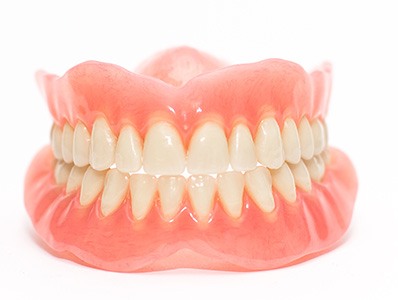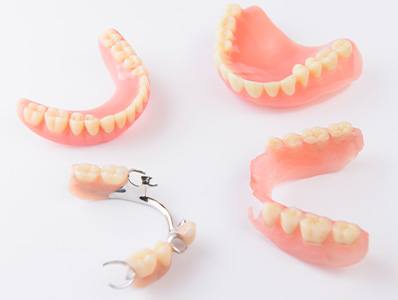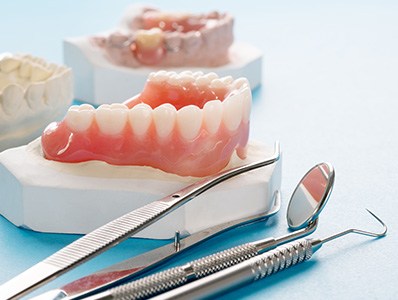Dentures – Annandale, VA
Get Your Smile & Confidence Back
Do you have one or more missing teeth? Are you also struggling with eating and talking? At Nova Smile Dental, we understand how difficult this situation can be, as it can affect both your confidence and overall quality of life. That’s why it’s important to replace your missing pearly whites, as you can regain your normal oral habits and preserve any remaining teeth. Fortunately, our team can provide the restoration you need with dentures in Annandale. Keep reading or speak with us directly if you’d like to learn more about this treatment option today!
Why Choose Nova Smile Dental For Dentures?
- Expert & Caring Dental Team
- Durable & Effective Restoration Treatments
- Professional Dentist With 20+ Years of Experience
Who's a Good Candidate for Dentures?

Almost anyone with missing teeth can be an excellent candidate for dentures, and the first step to getting one of these remarkable prosthetic dental appliances is scheduling a consultation with Dr. Salari at our Annandale office. During this appointment, she will thoroughly evaluate your mouth to determine if dentures can be a suitable way to complete your smile. If you aren’t ready to receive dentures yet, you may be able to become a good candidate later after undergoing treatments to restore the health of your gums and jawbones. Here’s a guide to the criteria a patient must meet to receive dentures as well as some information about a few other tooth replacement options.
Effects of Missing Teeth

Tooth loss is an unfortunately common problem that is often caused by advanced tooth decay, severe gum disease, or facial injuries. Unaddressed tooth loss can lead to a host of oral, overall, and psychological health issues like facial sagging, speech difficulties, trouble eating, and diminished self-esteem. Dentures have allowed many patients with missing teeth to enjoy the benefits of a complete smile and improve the overall quality of their lives.
What Qualifies You for Dentures?

Dentures can be an excellent solution for people who have lost many or all of their teeth or have severe dental sensitivity or extensive decay as long as they have sufficiently healthy jawbones and gum tissue. However, a denture patient must commit to excellent oral hygiene and a daily maintenance regimen. There are several types of dentures, and which one is right for you depends on the number of teeth you are missing. These appliances are generally more affordable than other tooth-replacement options, so they may be an especially excellent choice for patients on a budget.
Alternative Tooth-Replacement Options

If you aren’t a suitable denture candidate, you can explore other restoration options such as dental bridges and implants. Here’s a brief overview of these alternative tooth-replacement methods:
Dental bridges are ideal for patients who are missing one or several teeth in a row. These appliances require healthy teeth on either side of the gap to be reshaped so they can host the dental crowns that support the appliance.
Dental implants are titanium posts surgically inserted into and naturally fused with the patient’s jawbone, creating a sturdy hold that can last a lifetime. This allows them to support a restoration such as a dental crown, bridge, or denture so it can provide superior chewing power.
Types of Dentures
Thanks to advancements in dental technology, we can replace one or more missing teeth with dentures that look and feel like natural teeth. Here are several types of these restorations that we can provide:
Partial Dentures
We recommend partial dentures for patients who are not eligible for a dental bridge. Partial dentures replace rows of missing teeth with a dental prosthesis. This device clasps onto your remaining pearly whites to seamlessly fit with the rest of your smile. This type of denture is usually removable and prevents the shifting of any remaining pearly whites.
Full Dentures
These restorations are designed to help patients who are missing an entire row of teeth. These are also made of ceramic material like partial dentures, providing a natural-looking replacement for your smile. However, they rely on the suction with your gums, which can be challenging when learning to speak and eat with them. Be sure to use denture adhesives or speak with our team if you experience any difficulties with wearing them.
Implant Dentures
Unlike traditional ones, implant dentures are directly attached to titanium posts that are surgically embedded in your jawbone. Here are several variations of this treatment and how they restore the full function of your smile:
- Ball Attachment Denture: This type of denture requires two implants placed in the lower jaw and a denture that snaps onto the implants. This stabilizes the lower denture.
- Bar Attachment Denture: For a bar attachment denture, we place four to six implants into the lower jaw. After the implants are healed, they are connected with a custom support bar. The denture is made with special internal retention clips, or an overdenture, that attaches to the support bar.
- Screw Retained Denture: For these dentures, we place five or more implants in your jaw and attach a permanent denture. Your denture is held in place by screws or clasps that secure it to the support posts or bar. This denture will replace all your missing lower teeth.
How Dentures are Made

Now that you know more about the different types of dentures and who can benefit from them, it’s natural to wonder how they’re created. Your prosthetics are designed to fit like a glove, and understanding the process used to build your new teeth can help you appreciate them that much more! Continue reading to learn more about how your dentures are built, and feel free to contact us for additional information.
What are Dentures Made Of?

Whether you need a full or partial set, your restoration consists of two main sections: the base and the artificial teeth, or pontics. Further details about each component are outlined below:
- Denture base. This is the foundation that gives your dentures their shape and structure. It can be built from different materials like nylon, porcelain, resin, metal, or acrylic. The latter is the standard choice because it can be color-matched and carved to look just like your connective tissues. Partial sets usually also include metallic clips in the base to anchor them to healthy teeth in your mouth.
- These teeth are usually made from resilient resin or porcelain that reflects light like enamel, though porcelain is a popular option due to its durability. However, it can harm natural teeth, so it is best for patients needing a complete set of dentures.
The Denture Creation Process

Although it might vary slightly based on your unique circumstances, typically you can expect your prsothetics to be built with the following step-by-step process:
- Step 1: Salari will make impressions of your upper and lower arches to create a replica of your mouth, either manually or digitally, which will be sent to a special dental laboratory.
- Step 2: Once the lab receives your information, they begin building a wax version of your gumline.
- Step 3: Pontics are set into this max mold with a device called an articulator. Then, the base is shaped and carved to look as lifelike as possible.
- Step 4: These wax dentures are sent back to Dr. Salari so she can schedule you for a fitting. If everything checks out, they’ll be returned to the lab to be finalized.
- Step 5: Back at the lab, a technician places the wax model into a flask that’s filled with plaster to maintain its shape. This container is then placed in hot water to melt the wax portions away.
- Step 6: Acrylic must be injected into the flask to replace the wax, but first, holes are made in the pontics so the material will attach to them. Meanwhile, a liquid separator is included in the plaster layer to prevent the material from clinging to it.
- Step 7: The plaster is carefully chipped away using special instruments to reveal the completed dentures underneath. Then, they’re placed into an ultrasonic bath to remove any remaining residue.
- Step 8: Any excess acrylic is trimmed away, and your new teeth are polished to perfection.
- Step 9: Your restoration is delivered to Dr. Salari so she can schedule you for a final fitting to ensure your upgraded grin looks and functions as intended!
Adjusting to Your New Dentures

Now that your enhanced smile is in place, it’s natural to want to resume your usual activities. However, it often takes patients about a month to fully acclimate to wearing their dentures. It takes time for your connective tissues to adjust to supporting them all day, and your tongue and other supporting muscles must relearn how to perform basic tasks with them in place.
Sticking to soft foods for a few weeks and practicing speaking slowly at home can help ease your transition. You can also try denture creams or other adhesives that form a layer of cushion between your gums and your restoration to mitigate discomfort. This also helps them remain more firmly in your mouth so they don’t slip around during meals or conversations.
Benefits of Dentures

Dentures are one of the most popular treatments out there for replacing smiles. After reading the following benefits, you’ll see why! Overall, they’re a reliable, cost-effective option, time-tested by decades of widespread use. Without further ado, here’s what patients love about Dentures in Annandale!
Psychological Benefits

A person’s smile is one of the first things we tend to notice. For better or for worse, teeth are a major part of a first impression, which might be why many patients feel self-conscious about their missing teeth. They might talk less due to difficulties speaking, avoid showing their teeth in photos, or try to cover their laugh with their hands. If this sounds like you, a set of quality dentures from your Annandale dentist could give you the confidence to strut through social interactions fearlessly! Plus, a full set of teeth helps preserve your facial structure, meaning you’ll be able to rely on your dashing good looks for years to come.
Clearer Enunciation

Something interesting about the way we speak is that teeth are actually super important for forming certain sounds, especially in English. The “th,” “t,” “s,” and “d” sounds, for example, would be nearly impossible to pronounce without teeth. Dr. Salari will completely customize your dentures to fit your unique smile, so that when you need to speak clearly, you’ll have a full set of pearly whites to support you!
Improves Nutrition

Did you know that your teeth also play an important role in effective digestion? When you chew your food, saliva works to break it down and make it easier for your body to absorb the nutrients. Missing teeth can make eating uncomfortable, though, and can make it more difficult to break down your food. Dentures in Annandale can solve this problem, filling out your dental line-up for an even bite, comfortable chewing, and improved nutrition!
Preserves Oral Health

Without a replacement to fill in the gap, any remaining teeth in your smile will start to shift. They’re simply trying to compensate for the uneven pressure being exerted on your bite, but the newly crooked alignments can make the situation worse! With partial dentures securely in place, there won’t be anywhere for your pearly whites to move, and your dental structure will be preserved.
Expands Opportunity

The value of dentures, whether they’re full, partial, or implant dentures, is in how they open doors for patients – and we’re not just talking about expanded food options and improved oral function! Studies show that a full, beautiful smile can increase opportunities in both your professional and personal life. Those with aesthetically pleasing teeth scored as more likely to receive job offers, promotions, and even first dates! If you’d like to make an impression on others, consider dentures in Annandale.
Request a Dental Consultation Today
Call Dr. Salari at 703.763.0800 or schedule a dental appointment on our website today. Please let Dr. Salari and her team know if you have any more questions. They will be happy to assist you.
